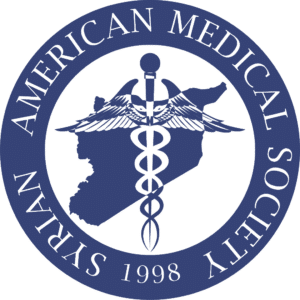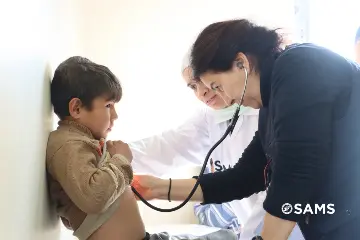April 4, 2025
More than a decade of conflict has left Syria’s health sector deeply fragmented and critically under-resourced. The collapse of institutions, ongoing displacement, widespread poverty, and economic sanctions have pushed the healthcare system to its limits—leaving millions without access to essential services.
To address this urgent reality, the Syrian American Medical Society (SAMS), in partnership with LUGARIT and the R4HSSS Project, has released a comprehensive Situation Report: “Syria’s Health Sector: Challenges & Intervention Priorities.”
This report is the result of a nationwide effort—drawing insights from a series of regional workshops held across Syria in early 2025 and informed by the perspectives of nearly 300 stakeholders, including healthcare workers, local officials, civic institutions, and international experts.
🔍 Key Focus Areas: WHO’s Six Pillars of Health Systems
Organized around the World Health Organization’s six core pillars, the report outlines both the current challenges and concrete, forward-looking solutions for each of the following areas:
- Governance:
- Lack of coordination and administrative independence
- Centralized decision-making and political interference
- Policy recommendations: decentralization, transparency mechanisms, and multi-stakeholder coordination platforms
- Finance:
- Chronic underfunding, sanctions-related constraints, and corruption
- Policy recommendations: creation of a health sector support fund, national insurance reform, and diaspora engagement
- Human Resources:
- Mass emigration of health professionals, training gaps, and urban-rural disparities
- Policy recommendations: medical education reform, rural workforce incentives, and international training exchanges
- Service Delivery:
- Infrastructure collapse, weak public-private regulation, and lack of health coverage
- Policy recommendations: national health mapping, structured referral systems, and improved rural access
- Supply Chains:
- Medicine and equipment shortages due to sanctions and inefficiencies
- Policy recommendations: support for local pharmaceutical production, supply chain reforms, and R&D investment
- Health Information Systems:
- Lack of unified data systems and technical capacity
- Policy recommendations: centralized digital platform, real-time data systems, and AI-powered analytics
💡 Why This Matters:
As Syria enters a period of political transition, rebuilding the healthcare system is not just a humanitarian necessity—it’s a cornerstone of long-term stability, dignity, and recovery. The SAMS report offers a roadmap for how local and international actors can work together to revitalize the system and prioritize the needs of vulnerable communities.
Whether you’re a policymaker, donor, healthcare practitioner, or advocate, this report offers critical insights to inform your strategy and support meaningful, sustainable progress in Syria.
Read the full report: https://tinyurl.com/4vujrm78
https://sams-usa.net/donate?utm_source=newsletter&utm_medium=email&utm_campaign=awareness&utm_id=sams_april_4_25



